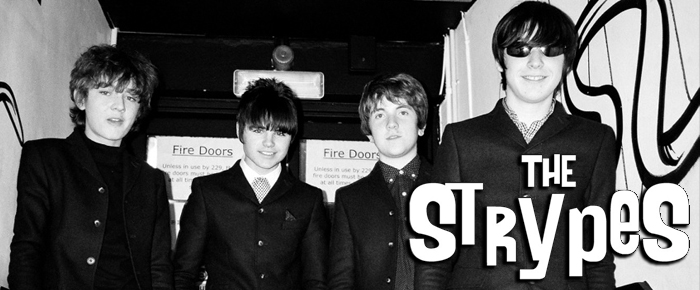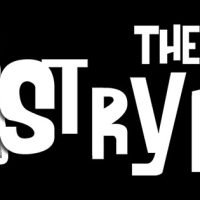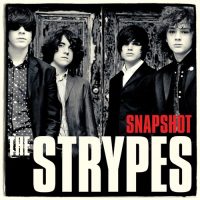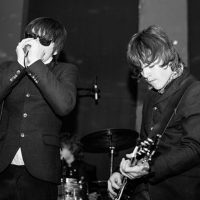
Do teenage bands like One Direction and 5 Seconds Of Summer make you weep for the future? Does Justin Bieber make you slightly bilious? Fear not, there is a remedy for these uncomfortable sensations: The Strypes.
The Strypes formed in their hometown of Cavan, Ireland back in 2008. Josh McClorey, (lead guitar, vocals) had just hit puberty when he hooked up with pals, Pete O’Hanlon (bass) Evan Walsh (drums).
Heavily influenced by their parents’ record collections, the teens began woodshedding. Along with school mates Conor Bates and Jack Hayden they made their live debut at a primary school Christmas concert.
By 2012, Bates and Hayden had dropped out of the band, so The Strypes recruited 15-year-old Ross Farrelly on lead vocals and harmonica.
Inspiration stretched back half a century. From Rock progenitors like Bo Diddley and Chuck Berry, to seminal Blues artists like Willie Dixon and Muddy Waters. Brian Jones-era Rolling Stones, well as the Yardbirds figured prominently, along ‘70s era Pub Rock-ers Rockpile and Dr. Feelgood.
And as they began to write their own songs, Elvis Costello and Nick Lowe (the Cole Porter and George Gershwin of the Punk era), served as touchstones.
Testing the waters, The Strypes released a four-song home recording on itunes. Covering Bo Diddley, Slim Harpo, Billy Boy Arnold and Motown’s Eddie Holland, the EP shot to the top of itunes’ Blues chart, remaining #1 for six weeks.
Not only did the EP prompt a bidding war between record labels, (they signed with Mercury in the U.K., Virgin/EMI in the U.S.) but some world class musicians took notice. Elton John, Jeff Beck, Roger Daltrey, Paul Weller, Dave Grohl and Noel Gallagher were all singing the praises of these teenage sensations.
When it came time to record their full-length debut, the band enlisted veteran producer Chris Thomas. Boasting an impressive CV that began back in the 60s, Thomas was on hand for the Beatles White Album and Pink Floyd’s Dark Side Of The Moon, as well as the Sex Pistols’ incendiary debut and essential albums from the Pretenders and Pete Townshend.
The sound that opens Snapshot, The Strypes’ first long-player, is 20 seconds of sustained feedback. A ballsy move, but these lads have the goods to back it up. The feedback segues into the opening track, “Mystery Man.” Angular shards of guitar wash over a pummeling beat as Farrelly alternates between Punky vocals and razor sharp harmonica fills.
While their melodies are stripped-down and tensile, The Strypes’ lyrics are crystalline and rich in detail. “Blue Collar Jane” is anchored by an urgent hand-clap rhythm, guitars that pivot between sweet jingle jangles and slash & burn riff-age and fluttery harmonica. The lyrics paint a vivid picture of a the femme-fatale next door…”Blue Collar Jane lives in 54, always has a teacup when she knocks upon my door/She just wants some milk and sugar, but all I want is her.”
Both “What People Don’t See” and “What A Shame,” take a gimlet-eyed look at the pitfalls of early success. The former employs the same sonic blueprint the Yardbirds’ “Certain Girl.” Jagged, guitars collide with a jittery, stop-start rhythms and wailing harmonica. The verdict is swift and succinct: “You’re today’s sensation but tomorrow’s looking bleak.”
The latter is more expansive: A verbose treatise on compromising one’s values for instant celebrity. The song moves at a twitchy pulse that accelerates to a frenetic crescendo on the instrumental break. The track is a 21st century companion to Tom Petty’s “Into The Great Wide Open.” Basically record labels love you, until they sign you, then they can’t wait to change you…“They said his hair could be better, if he colored it black/And he wouldn’t sound harsh if he could tone it all back.”
Every song is a winner here, but the stand-out tracks are “Perfect Storm,” “Hometown Girls” and “I Don’t Want To Know.” “Perfect Storm” matches yowling vocals to rumbling bass lines and a walloping backbeat, the lyrics extend the “sex as weather” metaphor.
On “Hometown Girls” Farrelly’s stuttery delivery is an backhanded tribute to the Who’s “My Generation.” Gangly guitar licks connect with a crackling drum pattern. Farrelly summarily spits out his dilemma…”I reek of sweat and teenage innocence.”
Finally, “I Don’t Want To Know” is powered by a triple-time tattoo, rattlesnake shake guitars, roiling bass lines and careening harmonica. It’s a kinda-sorta mash-up of Elvis Costello’s turbo-charged “Lipstick Vogue,” and the chaotic psychedelia of the Yardbirds’ “Over Under Sideways Down.” The whole thing collapses into a stinky, sodden satisfying heap.
Of course the band adds a few telling covers, there’s a menacing version of Bo Diddley’s “I Can Tell.” Willie Dixon’s “You Can’t Judge A Book By The Cover” jettisons the classic Chess/Chicago blues style, opting for an amphetamine fueled rush closer early Who, Rolling Stones and the Jam. The Strypes transform Nick Lowe’s “Heart Of The City” from a playful plea for love into a raucous rollercoaster ride.
Other interesting tracks include the clever and corrosive “She’s So Fine” here, the lads’ flip the infamous Muhammad Ali quip, insisting a girl is so fine because she “floats like a bee and stings like a butterfly.” The grinding Blues of “Angel Eyes” is as close as these Cavan swains get to a slow song. Swaggering and boastful, Farrelly allows that he’s a villain and a thief, but he “ain’t no Lee Van Cleef.” (The badass from “The Good, The Bad And The Ugly.”)
The album closes with a fuzz-tastic take on “Rollin’ And Tumblin’ “ that owes as much to McKinley Morganfield, (ne’ Muddy Waters) as it does to Pub-Rockers Dr. Feelgood. Frenzied staccato guitar riffs ride roughshod over a locomotive rhythm, blistering harmonica breaks and Farrelly’s authoritative growl.
Snapshot is the perfect title for this album, “an informal photograph taken quickly,” it captures a moment in time for these prodigious whiz kids. Surely they will progress to bigger and better things. But you can say you knew them when.














































